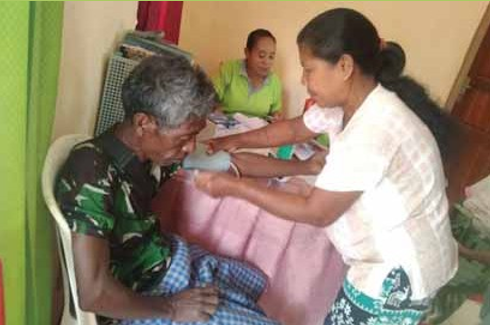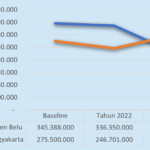


Integrated HIV and AIDS Control
September 4, 2024


Posyandu Services: Between Ideality and Reality
September 18, 2024Beyond the Numbers:
Evaluating Impact and Effectivities in the Integrated HIV Control Initiatives
Monitoring and Evaluation (ME) is vital in a social project as it provides a systematic and objective framework for tracking progress and assessing project outcomes or achievements. ME processes ensure accountability by evaluating whether a project achieves its intended goals and utilising resources effectively and efficiently. ME also fosters a culture of recorded learning and enables an organisation to make informed adjustments, change strategies where necessary, and optimise resource allocation to the best of its ability.
The data generated through ME will inform evidence-based decision-making, helping to provide a data framework for advice to decision-makers. In addition, ME promotes transparency, enabling open communication about successes and challenges while enabling adaptation to changing circumstances in a dynamic project environment. Ultimately, ME is critical to building credibility and securing funding, and most importantly, it plays a key role in maximising the overall effectiveness of a social project. This emphasis on effectiveness instils a sense of optimism and hope in the audience about the project's potential impact.
In line with the information above, CD Bethesda YAKKUM also views I as a crucial part of a project's success. The monitoring process carried out by CD Bethesda YAKKUM uses the format or criteria from the Development Assistance Committee (DAC) as its primary foundation. This paper will provide various discoveries, achievements, stories of change, and lessons learned during the ME process of the HIV and AIDS Integrated Control Programme in Belu District and Yogyakarta City during 2023.
Next, in-depth interviews were conducted with several government agencies, hospitals, PLHIV beneficiaries, AIDS Care Communities, and Peer Support Groups. Finally, participatory Focus Group Discussions (FGD) were conducted to collect data from AIDS Care Communities and Peer Support Groups.
Reflection from Belu Regency Context
The budget for health programs in Belu District in 2023, managed by the Disease Control Division of the Health Office and the Regional AIDS Commission, is approximately Rp 131,200,000. The funds will be allocated to Mobile VCT (IDR 27,200,000) and Health Resources Division (IDR 104,000,000).
Even though the funding amount is smaller than the previous year, the Regent's policy has introduced a significant change. Now, all residents with a Belu Regency identity card can access free treatment without registering with social insurance. This benefit extends to all corners of Indonesia, making it easier for PLHIV to access treatment, including for opportunistic infections. Policymakers in the Belu district believe that this policy is inseparable from community advocacy efforts for access to HIV care and treatment. Additionally, the Belu district government has allocated substantial additional funding of IDR 100,000,000 for Regional AIDS Commissions as operational capital for socialization and preventive promotive actions.
As of September 2023, five of the eight partner villages in Belu have allocated Village Funds for HIV and AIDS-related activities. Four villages allocate funds directly. The funds are used for various activities, including socialization, transport costs for active AIDS Care Community members who assist PLHIV, social assistance, and more. One village, Manleten, allocated cash transfers for PLHIV.
The following table details the Village Fund budget allocation specific to HIV for 2023:
Monitoring the progress of health services that provide the continuum of care shows that six units of health facilities have received a decree as a place for care, support, and treatment (CST) services. The six services are Atambua Regional Hospital, Marianum Halilulik Catholic Hospital, Public Health Centre of South Atambua, Atapupu, Wedomu, and Haliulik. In comparison, two units of public health centres have also been trained to serve the continuum of care service but have yet to receive a decree, namely the Public Health Centres of Silawan and Umanen. One other public health center, Ainiba, has not yet received a continuum of care service standardization training.
The existence of AIDS Care Communities in Belu District also showed significant progress. Their cooperation with the village government and health centres related to budget and other supporting infrastructure also developed during this period. For example, AIDS care communities cooperated with the village government and the village empowerment and family welfare to facilitate various activities jointly. There were also efforts to improve the quality of massage oil products and local food. Some even have a cash fund, which is collected voluntarily for several activities. The AIDS care communities also actively push for budget allocation from the village budget for HIV and AIDS issues. Also, they collaborate with PLHIV to produce local food deposited in stalls managed by PLHIV.
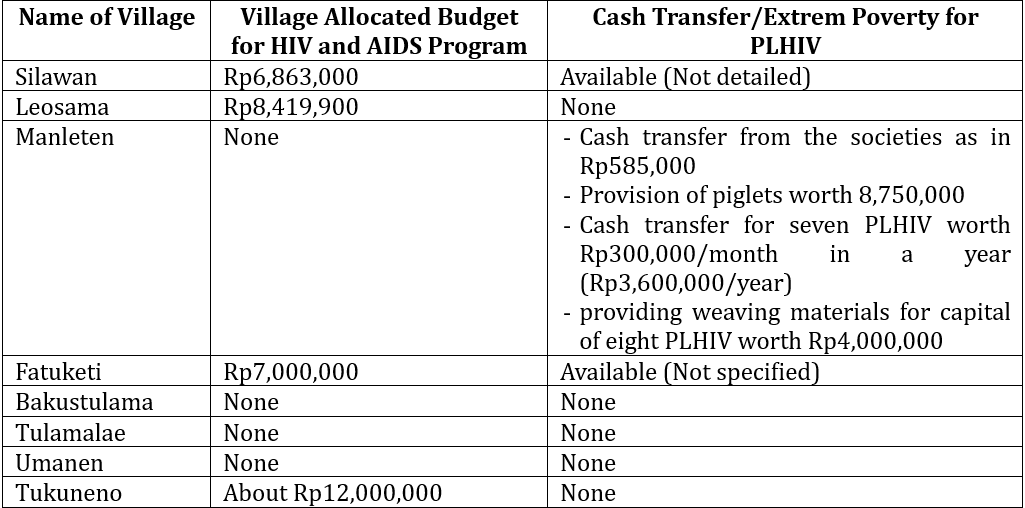

Monitoring the progress of health services that provide the continuum of care shows that six units of health facilities have received a decree as a place for care, support, and treatment (CST) services. The six services are Atambua Regional Hospital, Marianum Halilulik Catholic Hospital, Public Health Centre of South Atambua, Atapupu, Wedomu, and Haliulik. In comparison, two units of public health centres have also been trained to serve the continuum of care service but have yet to receive a decree, namely the Public Health Centres of Silawan and Umanen. One other public health center, Ainiba, has not yet received a continuum of care service standardization training.
The existence of AIDS Care Communities in Belu District also showed significant progress. Their cooperation with the village government and health centres related to budget and other supporting infrastructure also developed during this period. For example, AIDS care communities cooperated with the village government and the village empowerment and family welfare to facilitate various activities jointly. There were also efforts to improve the quality of massage oil products and local food. Some even have a cash fund, which is collected voluntarily for several activities. The AIDS care communities also actively push for budget allocation from the village budget for HIV and AIDS issues. Also, they collaborate with PLHIV to produce local food deposited in stalls managed by PLHIV.
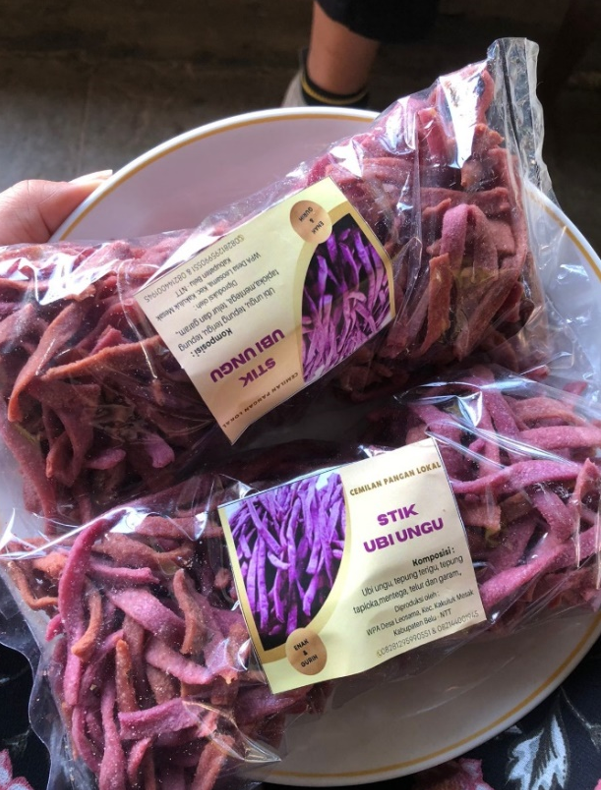

Local Food by AIDS Care Communities
After a full year of the process with the peer support group, it is clear that PLHIV has made significant progress. Regarding intrapersonal communication competence, PLHIV who came to the FGD during ME were willing to open their status because they felt empowered and supported by the peer support group and AIDS care communities. Some PLHIV were willing to give testimonies in education and advocacy activities in public events involving policymakers at the district level. PLHIV manages peer support groups as a place to share experiences and get reinforcement from PLHIV who have recovered.
Economically, there has also been a development of businesses run by individuals and groups of PLHIV. Some can open a company with capital or assistance from other parties. According to PLHIV, who are actively involved in peer support groups, these things can happen if ODHIV can accept their condition and are supported by those closest to them to get back on their feet. The long-term intervention of CD Bethesda YAKKUM is also considered essential in accumulating competence and networking skills so that PLHIV can focus on the changes they want to achieve.
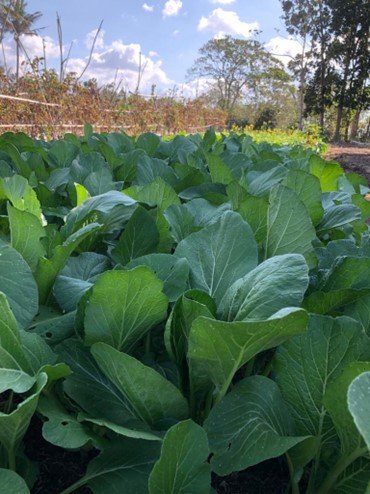

Vegetable Garden of a PLHIV in Belu
The Dream of Realizing Peer Support Groups’ Independence
Some PLHIVs dream of realizing their independence through activities in peer support groups, including self-actualization, confidence, health, safety, and having a source of funds. Self-actualization is an output that can be seen on the surface through activities such as 'daring to testify,' 'daring to take ARVs on their own,' 'networking with partners/other organizations,' and 'being able to advocate.'
Self-confidence is the ability to see one's potential within oneself and believe that one can do things that have a good impact, even if not in public. According to peer support groups, activities that reflect self-confidence include 'daring to educate the community', 'taking responsibility for one's own needs', 'open status', and 'daring to deal with others'.
Health for PLHIV means a commitment to access health services for themselves. PLHIV's health also depends on excellent health services, meaning 'easy access to ARVs' and 'peers support group members taking personal responsibility for their health'.
To be safe concerning independence, peer support groups need a safe space to continue their activities and grow. Secure, in this case, relates to the disappearance of discrimination, violence, and intimidation from parties outside peer support groups. In this case, peer support groups also emphasise the need for legality to oversee the sustainability of peer support group activities.
Having its source of funds for the continuity of activities, the peer support groups also realise that having a source of funds from self-help is one of the real steps that can be taken to achieve independence. This is also related to the fact that if CD Bethesda YAKKUM no longer assists KDS activities, financial freedom will still be one of the biggest challenges.
Reflection from Yogyakarta Municipality Context
Structural, biomedical, and behavioural HIV and AIDS control strategies to reduce stigma and foster social acceptance of PLHIV are still relevant. The second phase of the current program focuses more on strengthening the capacity of the continuum of care service providers to be more friendly and inclusive to PLHIV, ensuring that sub-districts and villages allocate budgets for HIV and AIDS-related activities, and preparing the peer support groups or care groups to be more independent.
Structural, biomedical, and behavioural HIV and AIDS control strategies to reduce stigma and foster social acceptance of PLHIV are still relevant. The second phase of the current programme focuses more on strengthening the capacity of the continuum of care service providers to be more friendly and inclusive to PLHIV, ensuring that sub-districts and villages allocate budgets for HIV and AIDS-related activities, and preparing the peer support groups or care groups to be more independent.
The Yogyakarta City Regional Budget 2023 allocation related to the integrated HIV and AIDS response is IDR 298,140,200. This figure increased by 8.22% from the 2021 baseline of IDR 275,500,000. However, this achievement has not met the program's target under CD Bethesda. This budget amount is a collection of program allocations from several fields in the Health Office related to HIV and AIDS response. In particular, the Prevention and Control of Disease Division, responsible for handling infectious diseases, allocates a special budget for HIV and AIDS response of IDR 138,617,000.
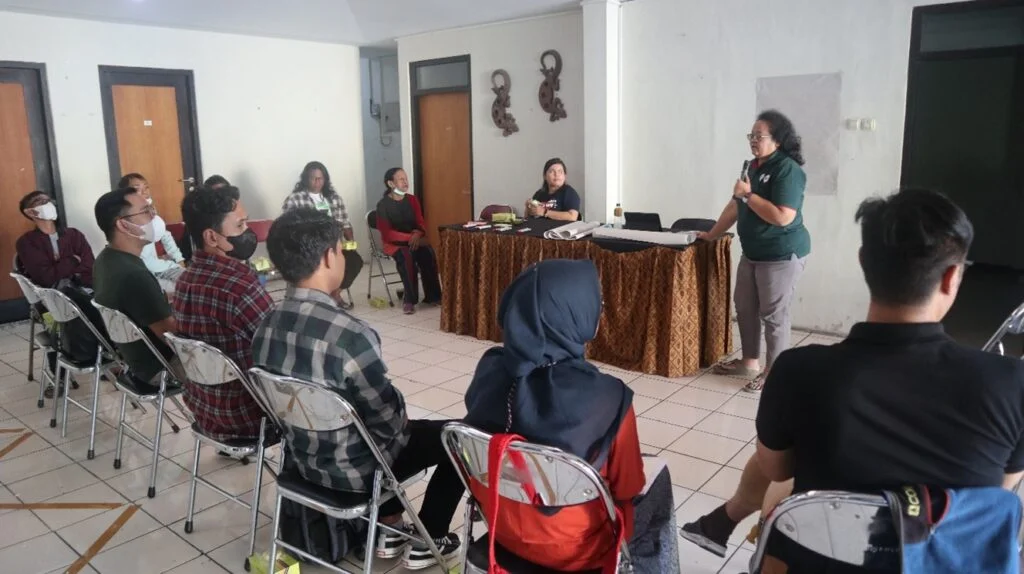

FGD in Monitoring and Evaluation of the Integrated HIV and AIDS Control in Yogyakarta Municipality
The budget allocation from the combined HIV and AIDS programmes was used for several activities, including World AIDS Day, monitoring and evaluation of the Regional Action Plan Strategy for HIV and AIDS Response, capacity building for HIV and Sexually Transmitted Infection (STI) analysis officers, staff incentives, office services, coordination of HIV service networks, and improvement of HIV services. The budget is also used to update knowledge on prevention of hepatitis in PLHIV, TB in PLHIV, data validation, procurement of VCT reagents, training on Tuberculosis Prevention Therapy in PLHIV for health workers, and training on services for victims of violence against women and children.
Although the Health Office of Yogyakarta City is still consistent with its commitment to budgeting for HIV and AIDS programmes, the budget amount will likely fluctuate annually. The budget in 2024 is predicted to decrease considering the national political agenda that affects the budget in all lines of government, namely the election, which absorbs much of the budget.
The strategic steps taken by the Yogyakarta City Health Office through the collaboration of the Prevention and Control of Disease Division with other areas in the Health Office should be commended. The Health Office of Yogyakarta City also integrates HIV and AIDS response with other health issues such as TB treatment, STI treatment, and other infectious diseases, which then become a comprehensive response strategy. Not only contagious disease management, HIV and AIDS programmes can be integrated with maternal and child health programmes, especially early detection (HIV screening) in pregnant women and HIV testing policy for couples getting married. This last activity has begun to be required for couples getting married as a condition of applying for marriage services at religious institutions.
The vision of the Health Office towards three zones to eliminate stigma and reduce premature deaths due to AIDS can be optimistically controlled in Yogyakarta City. The challenge or homework that is quite heavy is the elimination of new HIV transmission. Reaching zero (no new cases) is still difficult every year. This target is very challenging to meet because the notification system has not been running perfectly, and there is still a refusal of partners of HIV-positive housewives to be examined through VCT. Condom use as a safeguard is also low. Data from the City Health Office from the HIV and AIDS Information System shows that the average number of new infections per year is 271 cases. The number of new infections is very likely contributed by new clients from Yogyakarta and other places that access services in Yogyakarta.
The strength of the Health Office of Yogyakarta City is that it consistently allocates a special budget for integrated HIV and AIDS control, which is guarded by network work with NGOs and coordination between agencies and civil society organisations. The number of networks such as JAVA, Forbas, and others concerned about HIV and AIDS, on the one hand, is good enough to ‘accompany’ the policy implementation of the Yogyakarta Health Office. Still, on the other hand, it also raises the risk of conflicts of interest among network members that will be an obstacle to achieving targets if not managed well by the government itself, in this case, the Yogyakarta Health Office.
HIV and AIDS Allocation Budget Condition in Village
What about the budget provided by urban villages in Yogyakarta City? Most of the budget from the urban village is used for HIV and AIDS education and counselling activities coordinated by the AIDS care communities. In addition, the allocation is to support AIDS care communities through coordination meetings, education costs, and other activities. However, more than the funding from the urban village is needed to cover the needs of capacity building and education activities in the community that the AIDS care communities should carry out. AIDS care community activities are still ‘piggybacking’ on other routine activities with more consistent funding.
If it is possible to integrate HIV and AIDS prevention issues with other programmes, then the urban village budget is sufficient to support AIDS care community activities. Eight urban villages eventually used this strategy to integrate HIV and AIDS programs with other programs focused on vulnerable groups of youth, housewives, tuberculosis patients and STI patients, with a total of IDR 41,783,387.
Here is the detail:
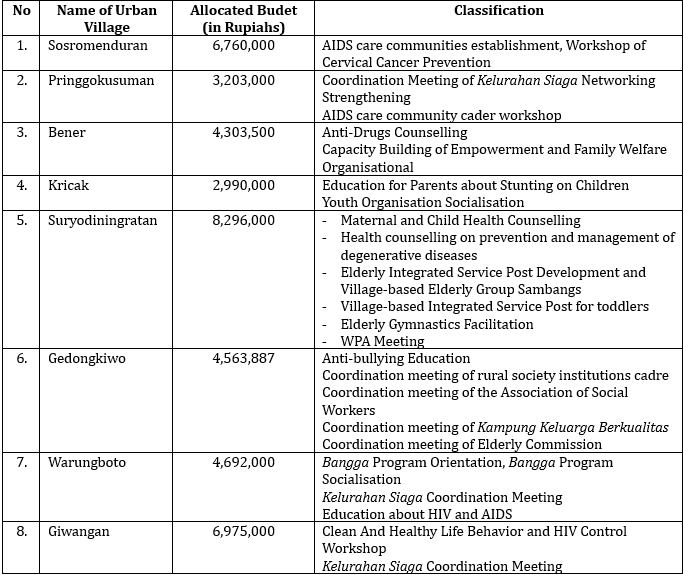

Allocated Budget for Eight Assisted Urban Village in 2023
Similar to the budget for health programmes managed by the Health Office, the health budget managed by the urban village government also fluctuates. The urban village staff acknowledges that it is difficult to allocate special programs, such as HIV and AIDS response. The strategic step is to make it one with another health program to maintain the budget. The need to support AIDS care communities cannot be allocated except for coordination meetings, and even then, usually for consumption purposes.
Similar to the strategic steps taken by the Health Office of Yogyakarta City, the urban village government is expected to maintain its commitment to budgeting for health program, and the issue of HIV and AIDS is still considered and accommodated, along with other topics for health promotion or education in the community. Specifically, regarding funding for AIDS care communities, in addition to the commitment of the urban village head, it is necessary to encourage them to seek independent funding sources from their members and joint efforts that bring in financial resources. Is this easy to do? Of course, there will be challenges that require hard work. It will take the volunteer spirit of the members to keep the AIDS care community alive and continue its activities unless there is funding support from outside parties.
The continuum of care service in Yogyakarta Municipality: Ready to be Inclusive
Another lesson learned from the program's internal monitoring and evaluation process in Yogyakarta City concerns the public health centre's status as a continuum-of-care service. One of the program's medium-term goals is to have hospitals and health centres become continuum-of-care services according to the standards set by the Ministry of Health.
Four health centres in Yogyakarta City are program partners: the Public Health Centres of Mantrijeron, Umbulharjo I, Gedongtengen, and Tegalrejo. All four public health centres have implemented the continuum of care service by Ministry of Health standards, but each unit is unique and has various service innovations. These innovations are:
- Gedongtengen Public Health Centre has an innovation called PLHIV Friendly Service. This service is in demand by PLHIV and other clients and is a plus point for the continuum of care service at Gedongtengen Public Health Centre. In addition, a One Stop Service (OSS) serves 24 hours. PLHIV registration services can be made online via WhatsApp on the day of arrival. When the client comes from the VCT test's beginning, reads the results, and to treatment, and is ris referred to peer support groups, it is done on the same day of ARV initiation.
-
Umbulharjo I Public Health Service has a plus service because it can build closeness with clients, facilitate communication with PLHIV, and allow patients to consult with all CST service doctors.
-
Tegalrejo Health Centre has innovations that make services attractive to PLHIV and other clients and become a plus, namely: 1) The Pre-exposure Prophylaxis (PreP) programme to prevent HIV with medication. 2) Key populations are willing to come to the service and dare to be tested because the requirement to participate in the PreP programme is HIV negative; 3) Strong networks with outreach and support groups that make it easier for Tegalrejo Public Health Centre to coordinate activities, both with support and outreach groups, the Health Office and patients/clients; 4) Considerable community of concern and participation in HIV prevention and control.
Although the target number of health services in Yogyakarta City that have implemented the standardised continuum of care service according to the Ministry of Health has been achieved, it needs to be encouraged to become an example of a continuum of care service that is friendly and inclusive to the elderly and people living with HIV and disabilities, especially since it is not yet able to provide palliative care. According to the three health centres participating in the discussion, NGOs are the most strategic partners for health centres to become quality of the continuum of care service. NGOs help with outreach and provide peer support workers. In addition, the AIDS care communities are also at the forefront of education for the surrounding community.
With more health centres implementing a continuum of care service, three-zero can be achieved more quickly. The implementation of the continuum of care service in Yogyakarta Special Region is increasingly evenly distributed; it is only now that patients can choose which services are available according to their location and convenience.
(Dewi Utari and Meta Ose Margareta br Ginting)


